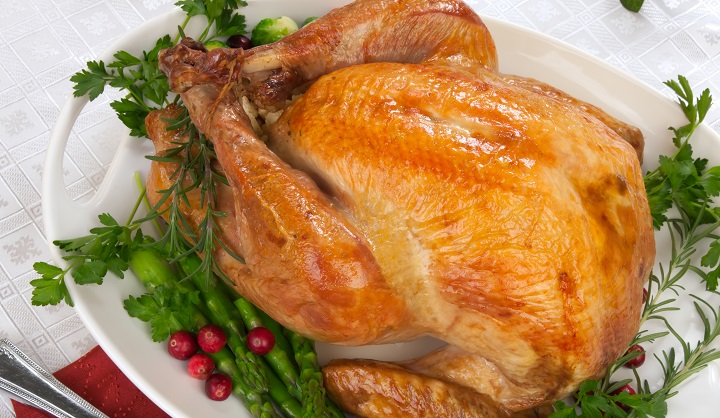
Is the “turkey coma” real?
(And a little nutrition advice)
Those feelings of post-turkey dinner drowsiness are all too familiar.
The turkey, stuffing, potatoes, and carrots, coupled with the delicious desserts of the fall season – pumpkin pie and all things apple. Stretchy pants and post-dinner naps are as much a part of many turkey dinners as cranberry sauce and pie.
But is that unavoidable post-dinner snooze (frequently known as the “turkey coma”) real?
We sat down with Applied Human Nutrition alumna and now Lab Instructor and Research Assistant Antonia Harvey to digest the topic.
 It’s not just about the tryptophan
It’s not just about the tryptophan
According to Antonia, now a Registered Dietitian, many people believe that turkey makes us tired because it contains the amino acid tryptophan. “Like many protein-rich foods, turkey contains tryptophan. Our brain needs tryptophan to make serotonin, a neurotransmitter, and melatonin, a hormone. These are both involved in regulating our sleep, and this is where the idea that turkey makes us sleepy comes from.”
But it turns out that increasing serotonin and melatonin in our bodies is not as simple as just eating foods that contain tryptophan.
“Tryptophan competes with other amino acids to enter the brain from our blood, so to increase the amount of tryptophan entering our brain, the amount in our blood would need to be a whole lot higher than other amino acids. We can’t change the type and amount of amino acids in whole foods, so eating a lot of turkey isn’t going to significantly change the amount of serotonin and melatonin in our body.”
So if turkey isn’t the culprit, then what explains the post-dinner yawns?
“The more likely reason that people feel sleepy after a turkey dinner is because they may be eating bigger portions than usual or having alcohol with their meal. After eating a large meal, blood flow increases to the gastrointestinal tract to help with digestion, which means less blood is flowing to the brain. This can make us feel tired. We also know that alcohol can make us feel drowsy.”
Antonia suggests that the diversity of foods available to us during many holidays is a reason why we may consume more. “People may be more likely to try more foods than they would during a ‘normal’ meal. And since we aren’t always eating heavy meals like this, we should give ourselves room to enjoy the food and the company around us.”
The goods news is that many of the foods we tend to enjoy at holiday times are nutritious. “Turkey without the skin is a lean protein and the vegetables we usually have alongside turkey are also nutrient rich. It’s what we add to the foods that can make them less nutritious, like high-salt gravy,” she says.
It’s about being mindful of portion sizes and alcohol consumption, suggest Antonia. “Have a lean protein like poultry, pork tenderloin, or a vegetarian option, and pair it with lots of non-starchy vegetables like salad, green beans, or broccoli. Include some carbohydrates like potatoes, squash, corn, or some stuffing for a well-balanced meal.”
Savour every bite
To help curb overeating, Antonia also recommends taking the time to savour your food and enjoy every bite. “When we slow down while eating, we are also more apt to recognize our hunger cues and to determine when we may be feeling full.”
And for all of those with a sweet tooth, you’ll be happy to know that Antonia doesn’t suggest skipping out on dessert. “If there are many different dessert options to try, have a smaller portion of each as opposed to a full serving.”
When asked what her favourite fall food is to enjoy, Antonia answers without hesitation. “I have a sweet tooth, and I like anything pumpkin or apple.”
So if you are planning to gather with loved ones this weekend to celebrate the season, and want to limit that sleepy feeling, try staying on top of portion sizes and wine consumption.